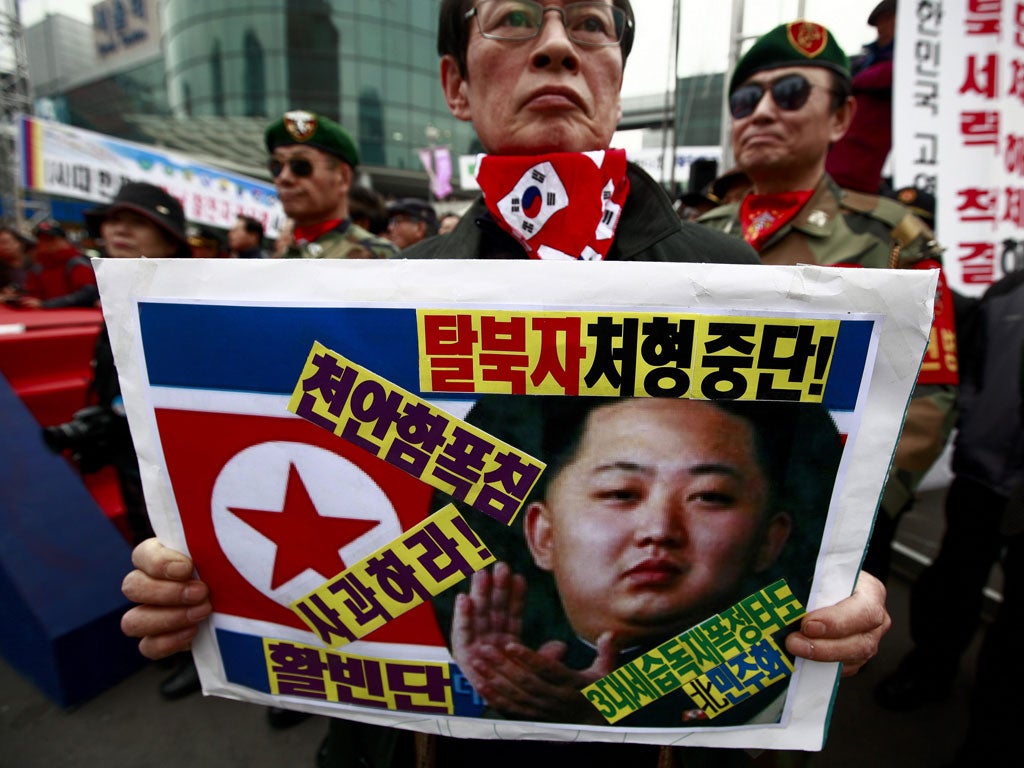North Korea's plan for new rocket launch stirs concern across region
Pyongyang says it will put satellite into orbit to mark centenary of country's 'Great Leader' Kim il-Sung

Your support helps us to tell the story
From reproductive rights to climate change to Big Tech, The Independent is on the ground when the story is developing. Whether it's investigating the financials of Elon Musk's pro-Trump PAC or producing our latest documentary, 'The A Word', which shines a light on the American women fighting for reproductive rights, we know how important it is to parse out the facts from the messaging.
At such a critical moment in US history, we need reporters on the ground. Your donation allows us to keep sending journalists to speak to both sides of the story.
The Independent is trusted by Americans across the entire political spectrum. And unlike many other quality news outlets, we choose not to lock Americans out of our reporting and analysis with paywalls. We believe quality journalism should be available to everyone, paid for by those who can afford it.
Your support makes all the difference.North Korea shocked its major international foes – the US, South Korea and Japan – by announcing plans yesterday to fire a long-range missile that in theory would be capable of reaching the west coast of America.
The move seriously jeopardises the secretive communist state's recent pact to secure food aid from the US in return for nuclear concessions.
North Korea said the purpose of the missile launch, from a site near its western coast, would be to put a satellite into orbit, but officials and analysts saw the explanation as cover-up for a test similar to one conducted three years go that prompted condemnation from the United Nations as well as tougher sanctions.
The launch will take place between 12 and 16 April from a site in North Phyongan province, a spokesman for the Korean Committee for Space Technology said in a statement carried by state media. It will coincide with massive celebrations surrounding the centennial on 15 April of the birth of the nation's "Great Leader" Kim Il-sung, who ruled for nearly half a century before dying in 1994, leaving power to his son, Kim Jong-il, who died in December.
The announcement put a question over the country's agreement with the US for food aid in exchange for a moratorium on nuclear and long-range missile testing.
Officials in Washington, Japan and South Korea strongly attacked the North Korean plan, which was revealed after visits by Kim Jong-il's third son, the North's new "Supreme Leader" Kim Jong-un, to military units just above the demilitarised zone that has divided the two Koreas since the Korean War.
The plan for firing the missile again increases regional tensions after hopes were raised in some quarters by the US-North Korea deal of 29 February. Despite optimism in Washington, South Koreans have been sceptical of a pact which they widely view as a North Korean attempt at deceiving the US while bypassing the South.
The North Korean announcement evoked memories of similar launches in August 1998 and April 2009 that Pyongyang insisted had put satellites into orbit. Analysts say no satellites were detected and the purpose was to test the North's Taepodong missile, which has the potential of carrying a nuclear, biological or chemical weapon as far as Hawaii, Alaska or even the western seaboard of the US. Doubts here have increased in recent days, while Kim Jong-un has urged soldiers to be on high alert, primed to "wipe out" South Korea's "traitor" President Lee Myung-bak South Korean officials have shrugged off such talk, but the government said that a North Korean missile test, under the pretext of launching a satellite, would be "a grave provocation."
Hillary Clinton, the US Secretary of State, hinted at the damage that the firing of another long-range missile could do to the agreement with North Korea, under which the US is to provide 240,000 tons of food aid. She warned that a missile launch would "pose a threat to regional security and would also be inconsistent with North Korea's undertaking to refrain from long-range missile launches."
Japan said the launch would violate UN restraints on the North's use of ballistic missile technology and endanger "peace and stability."
The view in South Korea is that a missile launch could derail the programme at least until further talks between thE US and the North. "Controversy will arise," said Kim Tae-woo, president of the Seoul-based Korea Institute for National Unification. "The US will have to postpone food aid. It should not be allowed."
Join our commenting forum
Join thought-provoking conversations, follow other Independent readers and see their replies
Comments